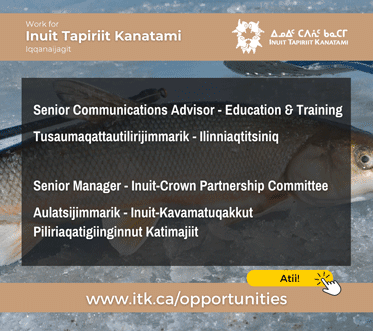First Air payouts among 'd;ivisive; issues
Tension high as delegates choose Makivik leader
INUKJUAK – Thirteen teams of sled dogs tethered to a storm-swept Arctic hillside can be an awesome sight.
They pull at their chains, the high-strung animals howl and wait for the air to blow clear. Only then can a tangle of dogs and men strike out for the trail.
The start of Ivakkak – Nunavik's dogsled race – was delayed on its way from Inukjuak to Ivujivik by bad weather for the first time in its history this week.
Only a little less obvious was the tension down the hill, inside Inukjuak's Innalik School gymnasium, where Makivik Corp.'s annual general meeting began right on schedule this past Tuesday morning.
Delegates from 16 communities, from all the regional organizations and representatives of the elders and youth met inside. They talked about everything from eider ducks to suicide, from establishing more provincial parks to hunting more muskoxen.
And by late Friday, March 27, they will hear who will be Makivik's next president. With it will come the prized perks of power.
Two of Kuujjuaq's most successful politicians are grappling for Makivik's top job right now. Incumbent Pita Aatami has led Quebec's Inuit birthright organization since 1998. Challenging him is Liberal Senator Charlie Watt, who last held Nunavik's top job in 1994.
Quaqtaq mayor Johnny Oovaut and Kangirsuk's Lucy Tukkiapik Carrier are also candidates in Friday's vote.
Pierre Corbeil, Quebec's minister responsible for aboriginal affairs, kicked off Makivik's four-day annual general meeting with prepared remarks that highlighted the comfortable relationship between the province and the Inuit.
While he made no newsworthy announcements, Corbeil re-committed to dealing with Nunavik's economic, social and environmental concerns. He left the meeting without taking any questions from the floor.
But despite the smooth start, after its first day of discussions, troubling questions hound Nunavik's leadership.
A presentation on Nunavik government negotiations – the so-called self-government file – met with surprising concerns from those assembled in Inukjuak.
Negotiators Minnie Grey and Harry Tulugak took time to carefully illustrate their proposals for the merger of Nunavik's public administrations, including organization charts for the various departments and the options for ratification, timetables and voting procedures.
Their plan aims for the first sitting of a regional assembly in 2013.
Yet it became clear in Inukjuak that despite decades of discussions, many Nunavimmiut still harbour misgivings about the direction the plans for the regional administration has taken.
Concerns were particularly high about the place for Inuit values in a non-ethnic government.
"It's only when our culture and language are recognized that we will have a strong government," said Charlie Arngak, president of Avataq Cultural Institute.
Around the meeting table delegates complained that the population still does not understand what kind of new government will take over four years from now.
"We are not well informed enough to support this Nunavik government," said Noah Tayara from Salluit. "How will our lives be improved?"
The Inuit negotiators insisted that no powers or rights will be lost in the new administration and that greater efficiency and financial autonomy will be possible.
But the negotiators also recognized how urgent it is that they visit the communities soon to explain the situation, which seems to be growing in complexity.
For some Nunavik Inuit, also still at issue are the reported millions paid as bonuses last year to the board of Makivik-owned First Air.
While the subject was initially not on the formal agenda of this week's annual meeting in Inukjuak, the item was almost immediately added to the schedule for discussion later in the week at the request of Makivik board member Rhoda Kokiapik.
Outside the meeting, Inukjuak resident Saroillie Weetaluktuk expressed his strong objection to the airline payouts.
"My heart is broken," said Weetaluktuk. He launched a petition – reportedly with more than 500 signatures now – against the bonuses late last year. "All the money should be given back," he insisted. "We're serious about this."
Candidate Charlie Watt also backed a call for the money to be returned to the airline. "I don't think the bonuses are justified, I think it's a money grab."
But others said they believe that far too much has been made of the payouts by those who would hunt for any political advantage in an election year and that the region must move forward from the controversy.
"I gave 15 years of service, including a lot of extra travel, to turning a money-losing company into a multi-million dollar earner," said Pita Aatami, who received $600,000 in special compensation.
"Management gets bonuses when companies make money," Aatami said.
Aatami also points to Makivik's overall excellent financial performance, even since the global economic meltdown began last fall.
He credits this to Makivik's shrewd investment in the bond market – not in risky stock shares – and to reductions in the corporation's expenses during his tenure.
A brief report on the efforts to revamp Nunavik's troubled youth protection system also sparked troubled concerns.
"We keep talking about this but we don't take action," said Kuujjuaq's Johnny Gordon. "For our youth, alcohol and drug use is their way of life. It's pretty bleak."
Delegates were urged to make changes in their own lives, to become better role models for the youth. The men at the meeting were encouraged to participate in community workshops about substance abuse and family violence, root causes of many youth protection cases.





(0) Comments